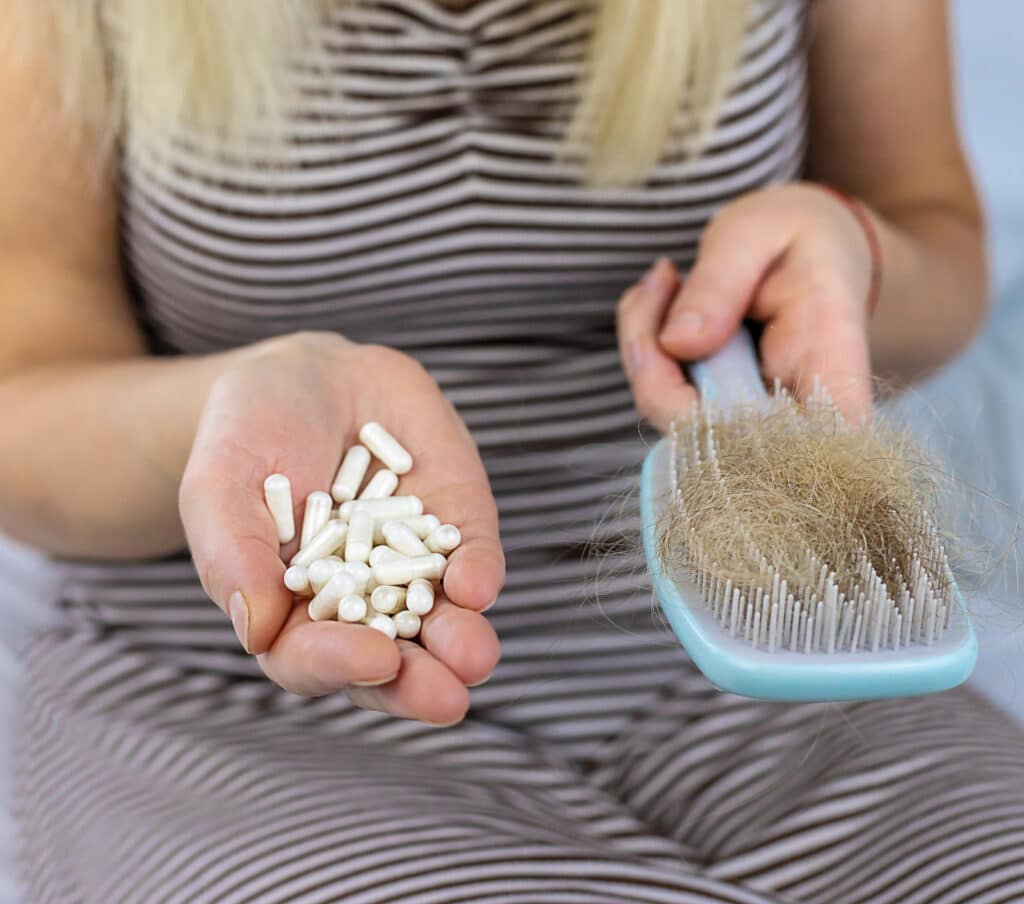Want to know more about top hair vitamins for women that help with hair growth? Our hair is only as healthy and strong as we are. This means, hair needs nutrition too, some help more than others. So, what are those nutrients that help with hair growth? Let’s take a look, shall we?
Hair Growth and Nutrition
Hair growth is not only decided by what we put on our hair. There are multiple factors that influence the growth and growth rate of our hair – nutrition, genetics, lifestyle, hormones, health and more.

Our hair, skin and nails all need nourishment among other things and that’s one of the main factors that determine our hair health. That’s why hair growth supplements have gained recognition and acceptance.
A well balanced diet is the key to ensuring our nutrition requirements are met, which translates to healthy hair growth. Most women with hair loss or thinning hair have been found to be deficient in one nutrient or the other.
At Vitamins Revive, it’s one of the first recommendations we do – proper nutrition with a priority for the top hair vitamins for women to combat hair issues.
Vitamin D and Iron deficiencies are more common with those enduring hair loss, though more nutrients support healthy hair and scalp. Let’s take a look at them and know more about how to incorporate them into our routine.
Why Do We Need Hair Growth Vitamins?
We all need essential nutrients of all types and kinds, not just the ones for hair. But these vitamins are more important for hair, skin and nails. What do they do for our hair?
Having hair supplements can help bolster hair growth and curb hair loss.
A hair growth supplement helps improve hair growth and regrowth rate.
Most B Vitamins are really great for hair and skin health and are considered the best vitamins for hair. However, other nutrients aren’t far behind.
Vitamin E & Biotin not only promote healthy hair growth, they also improve hair strength and density.
Dietary supplements inclined for hair can improve overall hair and scalp health, and curb hair thinning and hair loss.
Choosing the Right Vitamin Supplements
Choosing the right vitamin supplements is important for getting desired results. If you’re looking for hair growth, a hair growth vitamin supplement works best.
It’s not about including the best vitamins, there are hosts of other nutrients that are required too. B Vitamins are often recommended for hair, though minerals aren’t far behind. Vitamin D, C & even E is required for lustrous hair.
Besides, it’s important to understand what nutrients are lacking before choosing dietary supplements as vitamin deficiency is not the only threat for hair. What about amino acids? What about minerals?
Our hair follicles need all the help it can get in the nutrition department to promote hair health. Poor growth is more than just surface deep, a reason we need hair growth vitamin supplements are recommended by experts for those who are lacking in key nutrients. Consulting a specialist can help in choosing the right hair growth supplement.
What are the Top Hair Vitamins for Women?
Experts do have a take on what hair supplements are. But they mostly choose to take a few diagnostic tests before recommending a specific nutrient or supplement to support hair growth or otherwise.

It’s common knowledge that amino acids form the building blocks for our hair. That’s one reason why keratin treatments and supplements are recommended to increase hair density and more.
It’s usually biotin that’s recommended for hair growth, as it’s one of the essential vitamins for hair follicles and their health.
Next up is Vitamin D, as many women and even are deficient in this key vitamin. That’s thanks to reduced sun exposure and using sun blocks and whatnot! It isn’t called the sun vitamin for fun!
What about Omega 3? It’s recommended for lustrous and overall healthy hair.
Like that, each and every nutrient has a role to play. So, let’s see them one by one and learn more about each. Shall we?
Vitamin A
Crucial for cell growth and sebum production, Vitamin is important for healthier hair that’s moisturized. Carrots, spinach, kale and sweet potatoes are few food sources for this hair vitamin.
B Vitamins
Vitamin B1
Ensures blood circulation to the scalp – this means, it keeps hair nourished to prevent brittle hair, weak hair, etc.
Vitamin B2
Vitamin B2 has a role in energy generation and cell functioning. Cell functions are very important for the health of hair. Additionally, it is important for healthy hair growth.
Vitamin B3
Did you know Vitamin B3 helps improve scalp circulation and keeps hair follicles healthy? Improved scalp circulation not only clears few issues, it’s also important to ensure nutrient delivery to our hair and scalp.
Vitamin B5
Did you know Vitamin B5 curbs hair loss? Now, that’s a challenge many women face these days. How many of you can say, you never faced hair loss? None of us right?
Vitamin B6
This nutrient is important for protein metabolism. We all know protein is the main component for our hair.
Vitamin B7
Also, dubbed Vitamin H, it’s considered as the ultimate when it comes to vitamins for hair growth.
Vitamin B12
Plays a starring role in the production of RBC. We all know RBC is very important to ensure nutrient delivery.
There are many sources for B Vitamins if you’re looking to get it from food over supplements. Whole grains, nuts, seeds, leafy greens and eggs are good sources of Vitamin B Complex.
Vitamin C
An antioxidant too, Vitamin C combats free radicals that cause oxidative damage. Additionally, it’s also responsible for collagen production. This means, it is an important nutrient not only to promote hair growth but also hair strength.
Selenium
An antioxidant and micronutrient required by our body, Selenium keeps our hair follicles healthy and prevents hair damage. It also regulates thyroid functioning – we all know underactive or overactive thyroid takes a toll on our hair health. Right? Did you know fish and eggs are sources of this micronutrient? Then there’s Brazil nuts, too.
Magnesium
Not just for sleeping, Magnesium is important for several other functions in our body. Did you know it prevents hair loss, keeps our hair follicles healthy and reduces stress? We all know stress is a key trigger for hair loss. Keeping our hair follicles healthy means it will also strengthen hair. Nuts, dark chocolates and greens are few sources of this micronutrient.
Manganese
This micronutrient is very important for metabolizing nutrients that help our hair. In a way, it has a key role in keeping our hair structure and health intact. Don’t you think?
Folic Acid
Folic acid is not just for expecting mothers. Folic acid is important for cell division and DNA synthesis making it important for hair growth and health. Beans, lentils and asparagus are good food sources for this micronutrient.
Zinc
Let’s not forget zinc! It’s important for hair tissue repair and growth. I have noticed considerable improvement in hair growth when supplementing zinc with other nutrients.
How to Use Hair Growth Vitamins?
Supplements or topical usage is the way to go when you want to incorporate hair supplements in your routine.
However, supplements of any type or kind are best consumed with the advice and under the guidance of a professional. Also, they would know the right dose and recommend blood tests when necessary.
It’s important to prevent overdosing on nutrients. For this reason, many prefer topical application unless there’s a deficiency. This way or that, give it adequate time to observe and determine if something helps.
Side Effects and Precautions
Some supplements can result in allergic reactions, especially in scenarios where other medications are involved.
Also, supplements should always be chosen on the advice of a professional. This is more important for some who have a medical condition.
Any interactions or allergies should be considered.
Never consume more than the recommended dosage.
Pregnant or lactating mothers should not consume anything internally without medical supervision.
Conclusion
As with anything natural, give some time to determine if or not something is helping you. Supplements need a minimum of 2 – 4 weeks before any visible changes.
As with anything else, listen to your body for signs to understand what it’s telling you. You’re the best judge of what’s good or not for you.
Do what you have to do, try out different things and make sure to consult a specialist to understand what’s best for you. What else do you think you can do?
FAQs
How long before we see results?
As with anything natural, we let nature take its course. It could be anywhere from 2 – 4 weeks before we can see any change, if not longer.
Do hair supplements help?
Yes, hair supplements do help. From a comprehensive multivitamin, to specific nutrients, the options are many. Depending on the supplement chosen and other factors in an individual, the results can vary.
Why is a healthy diet important?
Healthy diet is the key for everything in our body. Same goes for hair. A healthy and balanced diet that includes all essential nutrients is important to stay healthy. But it also helps our hair health and increase hair growth.
How to improve hair health?
Many factors contribute to hair health. But main aspects that we could look into or change include keeping styling to a bare minimum if you can’t avoid it, have a hair care routine and keeping yourself healthy and active.
By hair vitamins, do we mean only vitamins?
Absolutely not! Multiple nutrient groups help our hair including minerals and amino acids. We need all the nutrients, not just vitamins for hair growth and health. Why else do you think hair supplements of all kinds and types including biotin supplements, zinc supplements, vitamin e supplements, etc. are suggested by experts?
Do deficiencies play a role in hair health?
Yes, many women who lose hair are found to be deficient in one or more of the nutrients related to hair. The most common deficiencies that cause hair loss include iron, b vitamins, vitamin d, etc. Did you know iron deficiency is one of the leading causes of hair loss in women? This is why hair growth supplements are becoming more popular.
Can I use natural styling aids?
You can absolutely offset styling related damage by staying away from chemicals and heat treatments. But if you can go with natural options for the same, yes, you can definitely do that. For example – there are natural coloring options you can consider instead of chemical-based hair colors.
What are some micronutrients that help with hair health?
Not just vitamins for hair growth and health, we also need other nutrients. Micronutrients that are important for hair include zinc, manganese, folic acid, selenium and magnesium.
Do dietary supplements help with hair growth?
Yes, nutritional deficiencies are considered as a major cause for hair loss and stunted growth. So, when supplements are consumed hair growth improves once the supplements start working.
What other causes besides deficiencies cause hair fall?
Nutritional deficiencies aren’t the only reason for hair loss, or reduced hair growth. Postpartum hair loss anyone? It’s a major causative factor in women. Besides, hormones or even health conditions can affect hair growth rate. Even one’s genetics can play a role.
Does Biotin prevent hair thinning?
Biotin deficiency can cause thinning hair. If that’s the case, consuming biotin supplements can help prevent thinning.
What are some vitamins for hair growth?
Vitamins A, C, D and B Vitamins are all important for hair growth and health.

